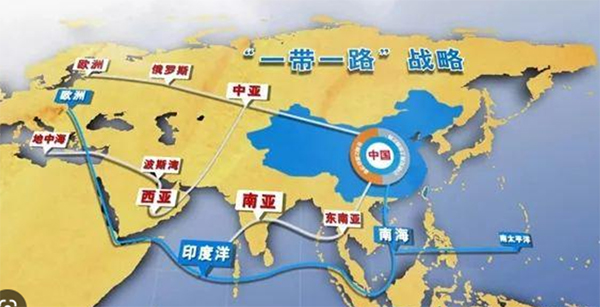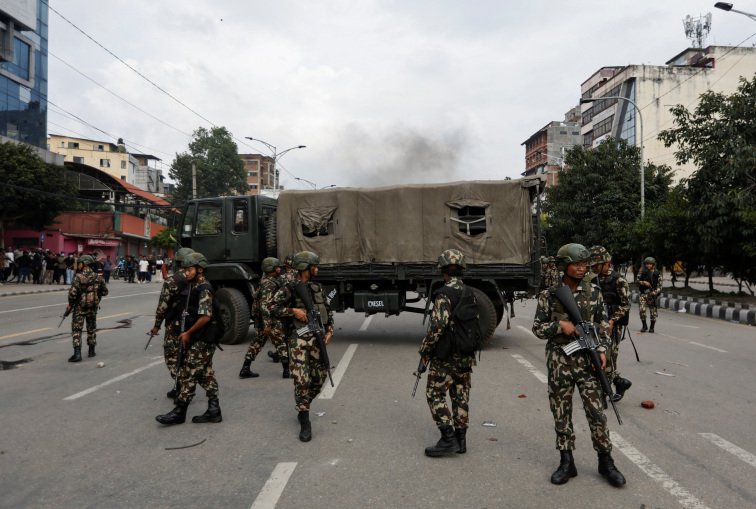Investment data shows that the Chinese Communist Party's Belt and Road Initiative (BRI) has shifted from large-scale infrastructure projects to less capital-intensive sectors such as IT and biotechnology.
[People News] On September 9, Khadga Prasad Oli, Prime Minister of Nepal and Chairman of the Communist Party of Nepal, announced his resignation. Reports say he and several senior officials attempted to flee in a military helicopter during mass protests, but were blocked at Kathmandu International Airport. The hammer-and-sickle Communist Party flag atop the party headquarters was torn down by enraged crowds. Multiple buildings—including the headquarters of Kantipur TV, regarded as a representative institution of the Communist Party, and the Parliament building—were set ablaze.
Shortly afterwards, President Paudel also tendered his resignation. This signifies the collapse of the pro-CCP Communist Party of Nepal’s influence.
This overnight upheaval stemmed from the day before, when a massive youth protest erupted in the capital Kathmandu against the ruling party’s clampdown on free speech, after it blocked 26 social media platforms, including Facebook, YouTube, X, and WhatsApp.
The move triggered strong discontent among young people in Kathmandu. They defied curfew and took to the streets, facing violent suppression by the authorities that left at least 22 dead and hundreds injured, igniting public fury. Outraged by government corruption and dictatorship, the masses rose in resistance. The protests quickly spread nationwide, with large gatherings breaking out in major cities such as Pokhara, Butwal, and Birgunj. Protesters demanded government accountability, transparency, and the lifting of restrictions on free expression.
Some military and police officers tasked with quelling unrest also defected and joined the protestors. Although the government swiftly lifted the ban, discontent did not subside.
Protesters stormed government buildings, the Parliament building, and the residences of Prime Minister Oli and several senior officials, setting them ablaze. Thick smoke and flames filled the sky, leaving buildings in ruins. The Communist Party headquarters’ flag was torn down as the crowd cheered loudly.
According to Reuters, in his resignation letter, Oli said he hoped to resolve the crisis through political means and thus decided to step down. Ram Chandra Paudel has begun searching for a successor and convened talks with protest leaders.
The 73-year-old Oli, a veteran communist figure who had served four terms as Prime Minister, saw his residence set on fire, according to circulating online videos. Officials have not disclosed his whereabouts.
Reports indicate Oli and several high-ranking officials attempted to flee aboard a military helicopter, but the airport was placed on full lockdown. Protesters called for drones, fireworks, and laser beams to disrupt airport operations and prevent their escape.
Additionally, videos circulating on social media show that the residences of the Interior Minister, the Foreign Minister, and other officials were also torched, with black smoke covering the skies. A man believed to be Finance Minister and former Communist Party of Nepal leader Bishnu Paudel was chased into a river by protesters, stripped down to his underwear, and paraded through the streets. Protesters also beat Sher Bahadur Deuba, leader of Nepal’s largest party, the Nepali Congress, and his wife, Arzu Rana Deuba, the current Foreign Minister. Videos show him being helped to safety.
The Economic Times reported that social media exposure of politicians’ children’s lavish lifestyles further fueled public anger over corruption and inequality. Around 5,000 young Nepalis are forced to work abroad every day, intensifying protest sentiment. Numerous video posts show the protests directly targeting the corrupt Communist government and its officials.
Following the 2022 elections, the long-standing pro-CCP Communist Party of Nepal (Unified Marxist–Leninist, CPN-UML), which had repressed Tibetans, became one of the ruling parties and the second-largest in Parliament. With the worsening situation, Nepal has entered a period of severe political uncertainty. Parties are expected to negotiate in attempts to form a new government. Analysts warn that if the government fails to respond effectively, the resistance movement could escalate further as students and civil society groups join in.
History has proven that authoritarian and corrupt regimes can collapse overnight. At present, Nepal’s neighbour—China, the world’s largest communist-ruled country—remains silent.
At the September 9 press conference of China’s Ministry of Foreign Affairs, only CGTN asked a question about Xi Jinping’s remarks at the BRICS online summit. Several Chinese domestic media briefly reported Oli’s resignation, mentioning his reappointment as Chairman of the Nepal Communist Party (Unified Marxist–Leninist) in March 2021. China News Service also noted that Oli had visited Beijing several times and delivered speeches at Peking University. Notably, Oli had just attended the CCP’s September 3 military parade in Beijing.
(People News First Release) △









News magazine bootstrap themes!
I like this themes, fast loading and look profesional
Thank you Carlos!
You're welcome!
Please support me with give positive rating!
Yes Sure!